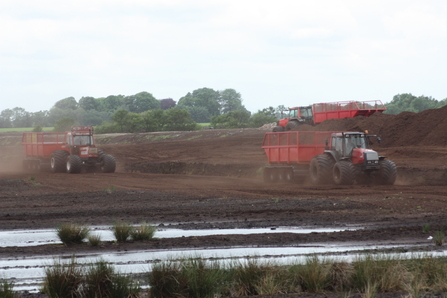The destruction of our peatlands has been something we have campaigned against for decades. Our precious peatlands have been drained and the peat extracted for use in horticulture, and this has played a big role in the deterioration of our environment, as well as the decline of the wonderful wildlife that calls these unique habitats home. One of the uses for extracted peat is compost. So, when Defra announced they were banning the use of peat in bagged composts, it was a welcome change that would hopefully be the first of many steps towards a brighter, peat-free future.

Peat extraction on Little Woolden Moss in 2011
The impacts of horticulture
Horticulture plays a devastating role in the impact extracted peat has on our environment, one which needs to be stopped as soon as possible. The current aim for a full ban of peat use in horticulture is by 2030. That isn’t soon enough.
The peat that was extracted for use in UK horticulture in 2020 alone could release 880,000 tonnes of CO2. That’s the equivalent of driving to the moon and back 4,600 times. That is an unbelievable statistic, but unfortunately one which will continue to shock us until something is done to stop it. Along with this terrible truth, on average, you could fill 29,000 shipping containers with peat from average UK sales from 2020. This could release up to 850,000 tonnes of CO2, another very scary but real fact that should be taken far more seriously.
The peat that was extracted for use in UK horticulture in 2020 alone could release 880,000 tonnes of CO2. That’s the equivalent of driving to the moon and back 4,600 times.
Why does extracting peat cause harmful CO2 emissions?
It’s due to the way peatlands trap carbon underground as the peat is formed. In a healthy bog, oxygen can’t reach the carbon rich peat, preventing CO2 from forming and being released into our atmosphere. Peatlands are naturally very wet, and it’s that amount of water, as well as the special vegetation cover, that prevents the oxygen from reaching the peat. When these key features are removed oxygen is then able to reach the carbon stored within the peat, causing it to oxidise and form CO2.
However, we can work towards restoring these sites, which can significantly reduce the number of emissions. On our Winmarleigh carbon farm, after the first year of re-wetting the site, we saw a huge 86 per cent reduction in greenhouse gas emissions. But as long as these sites are being extracted for peat, we simply can’t stop these emissions from being released. Which is why we are so worried about the current lack of legislation for the 2024 peat ban.
Bagged peat-free compost - Alex Critchley
What can you do?
If you’re a keen gardener, the easiest way to do your part is by going peat-free. There are lots of peat-free compost options available, with all the big retailers, and lots of independent nurseries, offering a selection. And don’t forget about plants. Many of these are still grown in peat compost, so always check for that precious ‘Peat-free’ label or ask staff. There has been a rise in the number of retailers growing their plants peat-free, with a growing selection of online peat-free nurseries that will deliver straight to your door. This also includes house plants, so even your indoor gardening can be free from peat as well. But be on the lookout for greenwashing. Some products will say ‘organic’ or ‘natural’ which can be misleading, as these may still contain peat
For all these reasons and more, we are calling on the Government to confirm the legislation required to cement the 2024 peat ban now.
Find out how you can take action for peat and download our free Peat Action Pack today. It’s stuffed with lots of different tips on how you can go peat-free and play your part in building a better future.
